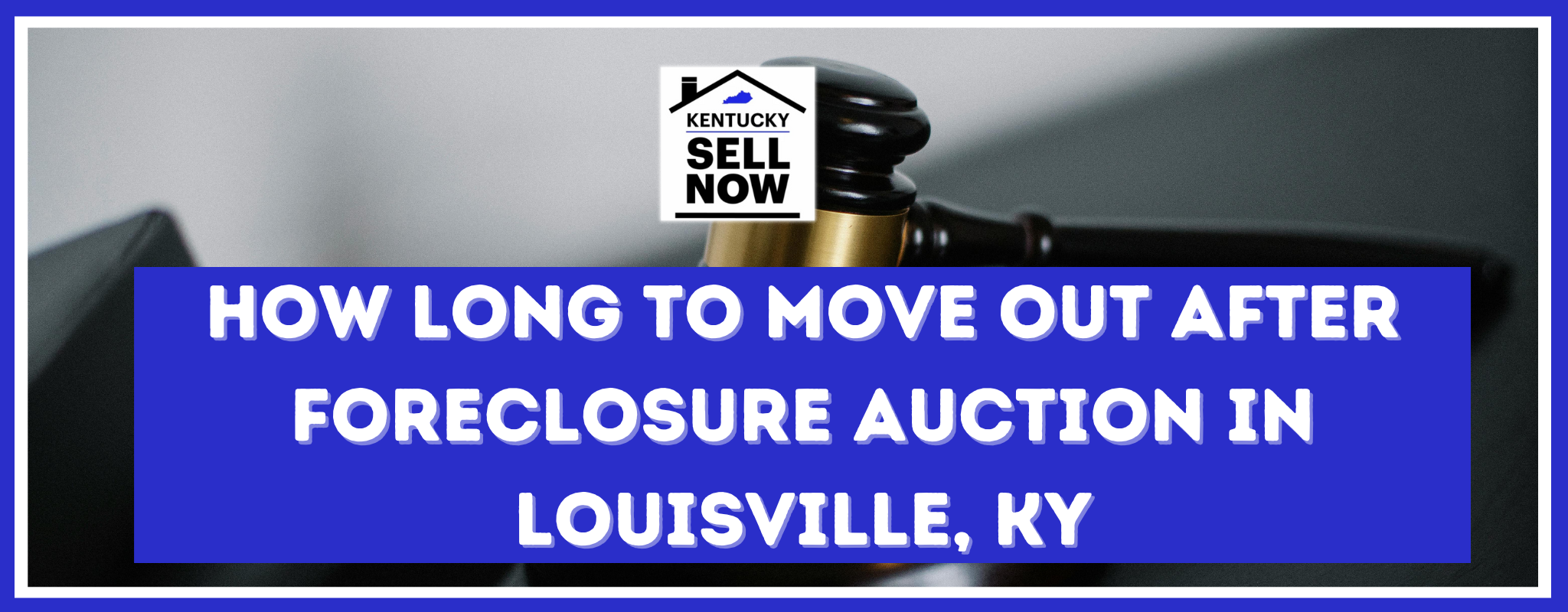
What are the post-foreclosure rights for tenants in Louisville?
Can Tenants Be Forced to Move Immediately After a Foreclosure Auction?
In Louisville, tenants have certain rights after a foreclosure. After a property’s auction, tenants are not forced to leave immediately. The new property owner must give an eviction notice after foreclosure and follow Kentucky’s legal eviction rules. Tenants often have the right to stay for up to 90 days, depending on their lease agreement. Knowing your tenant rights after foreclosure can help you handle this challenging situation better.

What Notices Must Be Provided to Tenants Following Foreclosure?
Once a foreclosure sale concludes, tenants should receive a formal notice that adheres to Kentucky’s eviction laws. This document includes a vacate notice specifying the duration tenants are required to vacate the premises. These letters must be explicit and adhere to the state laws of Louisville to ensure that tenants are fully informed of their rights and responsibilities during this time.
How Does the “Protecting Tenants at Foreclosure Act” Apply in Kentucky?
Renters are protected by the federal “Protecting Tenants at Foreclosure Act.” Kentucky tenants have unique rights after foreclosure. Legal leaseholders can stay until the lease expires unless the new owner plans to stay. Know how the PTFA affects Kentucky foreclosure laws to protect tenant rights.
What Steps Can Tenants Take If Facing Eviction After Foreclosure?
If facing eviction after foreclosure, consider these steps:
- Seek Legal Advice: For case-specific advice, speak with an attorney knowledgeable in eviction defense.
- Learn the Legal Eviction Steps in Kentucky: Understand the process to ensure that the actions taken against you are legally correct.
- Look into Foreclosure Eviction Assistance Programs: Various organizations help tenants facing foreclosure-related evictions in Kentucky.
If you need more help or have questions, consider contacting professionals for personalized advice. Always base your decisions on the most current legal standards and regulations.
Understanding the Timeline: From Foreclosure Auction to Eviction
What Happens Right After a Foreclosure Auction in Louisville?
In Louisville, the winning bidder, usually a bank, completes the sale after the auction. Properly transferring ownership means filling out legal paperwork and making financial transactions. Once the deal is done, the house belongs to the bank, evicting the previous tenants begins. In Kentucky, new owners can kick out people who used to live on land that was auctioned off. Homeowners in danger of losing their homes should discuss their options with lawyers.

How Long Does It Typically Take to Evict a Former Homeowner in Kentucky?
This is how long it takes to remove people from their homes after a foreclosure in Kentucky. Most of the time, the process begins soon after the foreclosure sale. The new owner gives a formal notice to vacate, including a time frame for eviction. People who used to live in a house usually have a few weeks to live alone. If they don’t, the new owner could go to court. In Louisville, evicting someone can take weeks or months, based on how quickly the law moves things along.
Are There Legal Ways to Delay Eviction After Foreclosure?
In some cases, there are ways to delay eviction after foreclosure. Homeowners can request an extension of the eviction notice period or ask the court for more time. Understanding the legal eviction steps in Kentucky is vital. The foreclosure eviction process might allow delays due to hardships or lender errors. Engaging in court proceedings in Kentucky could provide temporary relief. Consulting with a legal expert is advisable to explore these options effectively.
What Are the Sheriff’s Responsibilities in Foreclosure-Related Evictions?
In Louisville, foreclosure-related evictions are significantly influenced by the bailiff. The magistrate enforces the eviction order after a court issues a writ of possession. This encompasses the distribution of the eviction notice to the current tenants. The constable is responsible for physically removing individuals who fail to depart by the designated date. It is beneficial for all parties involved in the eviction process in Louisville to be aware of their rights and responsibilities.
For personalized advice, it is recommended that you consult with qualified legal professionals, especially regarding foreclosure laws and regulations. Contact Kentucky Sell Now for more information.
Preparing for Relocation: Moving Out After a Foreclosure in Louisville
What Are the First Steps to Take After Foreclosure in Louisville?
While foreclosures can be distressing, it is crucial to act promptly. Focus on the following initial steps in Louisville after the foreclosure procedure is complete and you receive a homeowner eviction notice:

- Understand Your Rights: Learn about Kentucky’s foreclosure laws and your rights and responsibilities. This will help guide your decisions.
- Plan Your Move: Get your move organized. Choose what to store, donate, or keep. Using a checklist can help you stay on course.
- Communicate with Lenders: Contact your lender or the new property owner. Confirm the timeline for leaving the property to prevent any issues.
How Can You Secure Temporary Housing Quickly After Foreclosure?
It’s critical to find temporary lodging as soon as possible after receiving an eviction notice. Here are a few Louisville resources:
- Eviction Mediation Services: Contact services that can provide interim remedies or guidance on seeking new accommodation.
- Explore Louisville Housing Resources: Contact local groups that assist the displaced. Shelters and transitional programs can provide immediate aid.
- Relocation Assistance Programs: Investigate government entities or non-profit organizations offering programs that promptly assist individuals impacted by foreclosure in locating temporary housing.
Are There Local Resources Available for Those Displaced by Foreclosure?
Louisville has several local resources to support individuals facing foreclosure:
- Community Aid Organizations: Groups like the Louisville Urban League offer foreclosure assistance and housing support.
- Foreclosure Assistance Programs: These agencies can guide you through the process and suggest possible relief options.
- Social Services: Social programs can provide necessities like food and clothing during your move. They can also link you with broader community support.
What Financial Assistance Options Exist for Relocating After Foreclosure?
Financial help can ease moving costs after a foreclosure. Explore these options:
- Kentucky Financial Programs: The state provides financial assistance to persons forced to relocate due to foreclosure. Investigate these options for possible assistance.
- Relocation Funds: Some charities offer grants or low-interest loans for moving costs. Contact local housing coalitions to see what’s available.
- Moving Expenses Support: Certain programs offer help with moving costs, such as hiring movers or buying supplies.
Consider speaking with a professional advisor or contacting the resources mentioned here for personalized advice. Visit the Kentucky Sell Now website for more insights on managing foreclosure transitions.
Navigating Legal Challenges After Losing Your Home
What Legal Recourse Do Homeowners Have After a Foreclosure Auction?
In Kentucky, going through a foreclosure auction can be daunting for homeowners. However, even after the auction, there might be ways to address your situation. Understanding Kentucky’s foreclosure laws is vital since they outline your rights and choices. You might have the right to redeem your property within a specific time or check for mistakes in the foreclosure process that could nullify the auction. Speaking with a legal expert can help you understand these options and find possible solutions.

When is it advisable to seek legal counsel post-foreclosure?
Talking to a lawyer after eviction is often helpful to learn about your rights and duties. If you aren’t sure about the eviction process or think something went wrong, you should talk to a lawyer. Attorneys focusing on foreclosure cases can help you file challenges or talk to creditors about your options. Their knowledge enables you to make wise decisions, so you don’t give up any legal rights without meaning to.
How Can Filing for Bankruptcy Affect Post-Foreclosure Actions?
Filing for bankruptcy can significantly impact actions taken after foreclosure. Filing under Chapter 7 or Chapter 13 might create an automatic stay, which temporarily stops eviction proceedings. This pause lets you sort out your finances or negotiate with your lender. Each type of bankruptcy has different effects and rules, so talking to a bankruptcy attorney is essential to see how it applies to your case.
What Are the Potential Consequences of Refusing to Vacate the Property?
Deciding not to leave your home following foreclosure leads to specific outcomes in Kentucky. The new owner must follow the eviction process, starting with obtaining a writ of possession. If you continue to resist, law enforcement can remove you legally. This action can increase stress and hurt your credit score. Knowing these possible effects helps you make better decisions about your future housing situation.
Consider contacting a qualified legal professional for assistance tailored to your circumstances. They can provide valuable insights and support during this challenging time.
The Impact of Foreclosure on Future Housing Opportunities
How Does a Foreclosure Affect Your Credit Score and Rental Applications?
A foreclosure can dramatically impact your credit score, lowering your chances of getting approved for rental applications. When a homeowner faces foreclosure, their credit score decreases dramatically, making it more difficult to obtain housing in the future. Landlords regularly examine credit scores to determine rental eligibility, and foreclosure may suggest financial difficulties. Knowing how long this influence lasts and what landlords look for when reviewing rental applications is critical.

What Steps Can You Take to Rebuild Credit After Foreclosure?
Rebuilding credit after going through a foreclosure is key to financial recovery. Here are some steps to help you improve your credit score:
- Review Your Credit Report: Get a copy of your credit report to check for errors. Fixing any inaccuracies can benefit your score.
- Pay Bills On Time: Paying your bills promptly is one of the best ways to boost your credit score.
- Open a Secured Credit Card: This card helps show responsible credit use. Make small purchases and pay off the balance each month.
- Diversify Credit Types: Consider only a small personal or installment loan if you can manage the payments.
- Limit New Credit Applications: Avoid applying for multiple new credit lines simultaneously, which can hurt your score.
These actions can gradually increase your credit score, opening doors to better financial opportunities.
Are There Programs to Help Former Homeowners Rent Homes After Foreclosure?
Yes, several programs can assist former homeowners in renting homes after foreclosure:
- HUD Rental Assistance Programs: The U.S. Department of Housing and Urban Development provides rental assistance programs to assist individuals recovering from foreclosure.
- Local Government Initiatives: Many local governments have programs to aid residents in finding affordable rentals after financial difficulties.
- Nonprofit Organizations: Groups like the Salvation Army and United Way offer rental assistance or temporary housing solutions.
By utilizing these resources, individuals can find stability and support during a tough transition.
What Are Considerations for Buying Another Home Post-Foreclosure?
Buying another home after a foreclosure requires careful planning:
- Assess Financial Readiness: Make sure your finances are stable and you have a steady income before considering buying again.
- Research Mortgage Options: Look into different options and talk with lenders working with individuals with foreclosure histories. Some government-backed loans may be more forgiving.
- Save for a Down Payment: Aim to save a larger down payment. This can help secure a loan with better terms.
- Stay Informed on the Housing Market: Keep up with housing market trends and interest rates to make a wise purchase decision.
Considering these factors can help improve your chances of successfully buying a new home with favorable mortgage terms.
For tailored advice, consult a professional advisor or explore the resources provided. Visit the Kentucky Sell Now website for valuable insights on managing foreclosure transitions.
FAQs:
What is the foreclosure process in Louisville, Kentucky?
The foreclosure process in Louisville commences when a lender submits a lawsuit due to unpaid mortgage payments. The property is auctioned after the court approves the foreclosure. Homeowners must comprehend their privileges during this period. The process and timeline can be clarified by consulting with a legal professional.

How long do you have to move out after a foreclosure auction in Louisville?
Generally, you must move out within 30 days after a foreclosure auction in Louisville. This timeline can vary depending on specific circumstances and local regulations. Reviewing Kentucky foreclosure laws or consulting an attorney can provide precise guidance.
What are Kentucky’s foreclosure laws regarding eviction after an auction?
In Kentucky, the vendor must adhere to judicial procedures to evict current residents following a foreclosure auction. A formal eviction notice will be issued, and failure to comply may result in additional legal proceedings. Comprehending these regulations facilitates the prevention of unexpected outcomes after the auction.
Can the foreclosure eviction process in Louisville be delayed?
Yes, the eviction process in Louisville can sometimes be delayed with legal intervention. Filing for bankruptcy or negotiating with the new property owner might temporarily extend your stay. Seeking legal advice is crucial to exploring these options effectively.
What rights do tenants have after a foreclosure in Kentucky?
Tenants in Kentucky have the right to proper notice before eviction after a foreclosure. The Protecting Tenants at Foreclosure Act ensures tenants can stay until their lease ends or receive at least 90 days’ notice to vacate.

Are there any timelines for moving out after a foreclosure in Kentucky?
Yes, typically, you have about 30 days to move out after the Kentucky foreclosure process concludes. Always check your eviction notice for specific terms and consult legal counsel to understand your obligations and options.
What happens after the foreclosure sale is finalized in Louisville?
Once a foreclosure sale is final in Louisville, former homeowners may receive an eviction notice. Buyers, often banks or investors, use legal means to take possession. Comply with notices and seek legal help to contest the eviction.
Where can I find help with eviction due to foreclosure in Kentucky?
In Kentucky, agencies like housing authorities and legal aid organizations offer help with foreclosure evictions. They guide people through the eviction process, helping them understand their rights and find alternative housing. For reliable advice, contact professionals familiar with Kentucky’s real estate laws.
Key Insights
- Understanding the foreclosure auction in Kentucky is essential, especially in cities like Louisville, where procedures and timelines can vary.
- After a foreclosure auction in Kentucky, knowing how long you have to move out is key. This depends on factors like Louisville foreclosure regulations and Kentucky auction laws.
- The foreclosure eviction process involves obtaining a writ of possession in Kentucky, which is necessary for legal property repossession.
- Louisville has specific procedures for judicial foreclosure, including legal eviction steps and sheriff’s eviction protocols, which affect your vacate timeline.
- Kentucky real estate foreclosure laws offer protections for homeowners and tenants, but it is crucial to understand processes like bank property eviction and mortgage foreclosure.
- If facing eviction after foreclosure, mediation services in Louisville and Kentucky eviction assistance programs can provide support.
- Foreclosure impacts tenants, too, so you should know Kentucky eviction notice requirements and explore post-foreclosure living arrangements.
- Property turnover timelines in Kentucky and foreclosure sale finalizations dictate when eviction can occur, influencing your moving plans.
- Louisville residents can request eviction extensions or appeal eviction decisions, underscoring the importance of knowing your repossession legal rights in Kentucky.
- It is recommended that you seek advice from legal professionals to navigate the impacts of foreclosure, handle eviction costs, and defend against unreasonable eviction actions in Louisville.
This information applies to Kentucky and its cities, including Louisville, Lexington, Bowling Green, Owensboro, and more. For more details, please call us at (502) 610-0070 or visit our website at Kentucky Sell Now.


